The Outsiders?
By Amir Zia | Cover Story | Published 7 years ago
That the outrage and dismay generated by the removal of world-renowned economist Atif Rehman Mian from the Economic Advisory Council (EAC) set up by the Pakistan Tehrik-e-Insaaf (PTI) barely a month ago has more or less died down, is a victory for the Islamic parties and their allies. They had forced the government to remove Atif Mian from this post – an official body – since he belongs to the proscribed Ahmadi faith, even though constitutionally there is no bar on such an appointment.
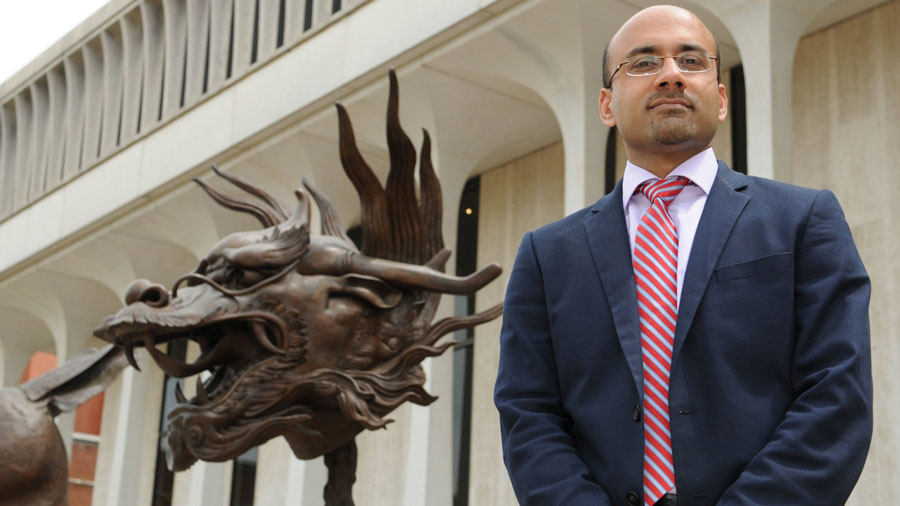
Now barring an occasional statement or a tweet taking a dig at the way the PTI government caved into the pressure exerted by fundamentalist, puritan forces on the issue, it is business as usual in the Islamic Republic, where other pressing problems and controversies have engaged social media and political activists. But the challenge of religious extremism, discrimination and intolerance toward religious minorities and smaller subgroups within Muslims, remains all-too real in our society, and continues to balloon with every passing day.
Although the intensity of this discrimination, victimisation and bias varies from region to region and is more pronounced against certain specific minority religious groups and Muslim sects than others, the reality remains that the vast majority of Pakistani Muslims are tolerant, and have no issue with people belonging to other faiths and sects.
The case of Pakistani-American, Atif Mian – a professor of economics and public policy at the prestigious Princeton University – highlights the way a person belonging to a religious minority, particularly of the Ahmadi faith, can be targeted even at the highest level, in violation of the basic spirit of our Constitution. Article 27 of the Constitution states that “no citizen otherwise qualified for appointment in the service of Pakistan shall be discriminated against… on the ground only of race, religion, caste, sex, residence or place of birth.”
And despite all the indignation expressed by the enlightened and educated segment of Pakistan, this sad incident of discrimination against Atif Mian won’t, almost certainly, be the last one in the country, where organised radical Islamic groups have proved umpteen times that they can, and do dictate policy to the mainstream political parties and the government, as well as dominate the national narrative at their whim.
For a person of the international stature of Atif Mian, being ousted from the honorary position of the Economic Advisory Council (EAC) is perhaps a small matter with no direct impact on his life. But his removal is a huge, damaging symbolic blow to Pakistan’s image across the world – and sends an alarming message to Pakistani citizens: this is not the state envisioned by Quaid-e-Azam.
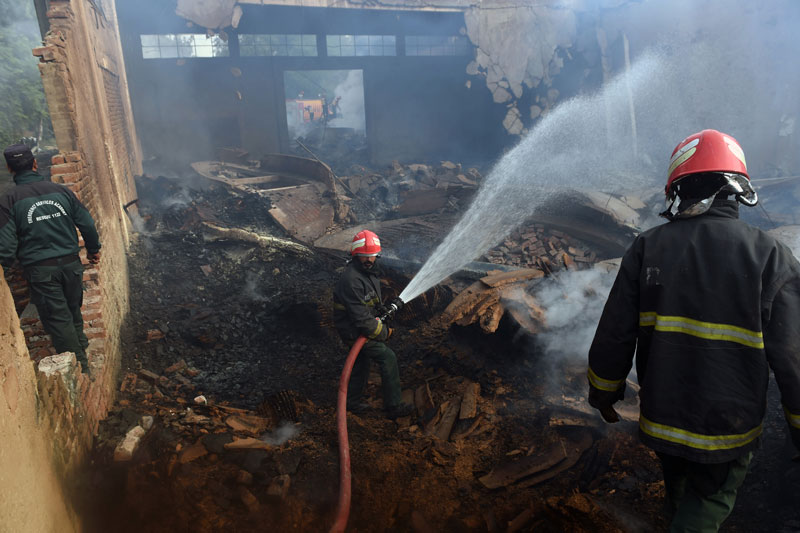
Jhelum 2015: Firefighters extinguishing the fire of an Ahmadi-owned factory torched by an angry mob.
Following Atif Mian’s removal from the EAC, there is an even more palpable sense of fear and uncertainty in the hearts and minds of members of religious minorities in Pakistan, especially those belonging to the lower classes, and the sub-groups and sects within the Muslims who are not as empowered as Atif Mian, or do not have the option of migrating to offshore safe havens. These men and women face discrimination, hate and bias in various forms almost daily, and sometimes pay with their lives at the hands of religiously-motivated extremists.
However, the most targeted community in Pakistan remains the Ahmadis – declared non-Muslims by the Parliament in September 1974 when the founder of the Pakistan Peoples’ Party and the then Prime Minister, Zulfikar Ali Bhutto was in power. After being declared a religious minority, the Ahmadi issue should have been settled once and for all. But the Islamic parties kept up the pressure, demanding that members of this proscribed group themselves accept that they are non-Muslims. The result: a continuing hate campaign against the Ahmadis, resulting sometimes in violent attacks on their places of worship and neighourhoods.
“Ahmadis are the most persecuted community in Pakistan,” says veteran human rights activist and former chairperson of the Human Rights Commission of Pakistan (HRCP), Zohra Yusuf. “People are even afraid to offer lip-service asking they be given their rights,” she said, highlighting the brazenly hostile attitude and malice towards this community in society in general.
The PTI government had to stage a hasty retreat on the Atif Mian issue presumably because this could have opened an unnecessary front in the opening days of its government. As it is, some members of the mainstream opposition parties joined hands with religious groups on this issue, with some supposed secularists, slamming Atif Mian’s appointment, both inside and outside Parliament. The Ahmadi issue is considered too explosive to be taken lightly by any government because of its potential to evoke violent passions across the country. It is a hot potato no one wants to touch and on which religious parties alone have the final say. No wonder every government has shied away even from ensuring that Ahmadi citizens of the state are provided their basic constitutional rights.

Sialkot 2018: An Ahmadi mosque’s minaret and dome severely vandalised by a rampaging mob.
“For Ahmadis, conditions are not improving; they are going from bad to worse,” says Saleem Ud Din, spokesman of the Jama’at Ahmadiyya Pakistan. “Our targeting continues – from discriminatory state policy to mob attacks … if a decision on Atif Mian’s appointment can be reversed, imagine the plight of common Ahmadis. No other community is being isolated and targeted like us. Even during the election process, our names were included in separate lists rather than in joint lists with other voters. This discrimination was only with the Ahmadis.”
According to figures shared by the Jama’at Ahmadiyya, since 1984, at least 264 Ahmadis have been murdered in hate incidents. In 2017, four Ahmadis were murdered, while in 2018 one person belonging to this community has been killed so far. A number of Ahmadiyya places of worship have also been attacked or burned down over the years.
Saleem Ud Din said that being “law-abiding citizens, his community members respect the Constitution. “The Constitution has declared us non-Muslims, but there are forces which want to define our faith on our behalf, which is unacceptable.”
Leaders of the Ahmadiyya Jama’at complain that hate propaganda is also rampant against them, especially in the Urdu-language media in which 3,936 news items and 532 editorial write-ups were published against their community in just one year.
The Ahmadis are persecuted in a systematic manner and allowed little space in society. All shades of Muslim sects in Pakistan, with scores of differences among themselves, remain united in their anti-Ahmadi theological discourse and teachings.
While the Ahmadi community remains the most persecuted, life is also difficult for other religious minorities and sects within Muslims.
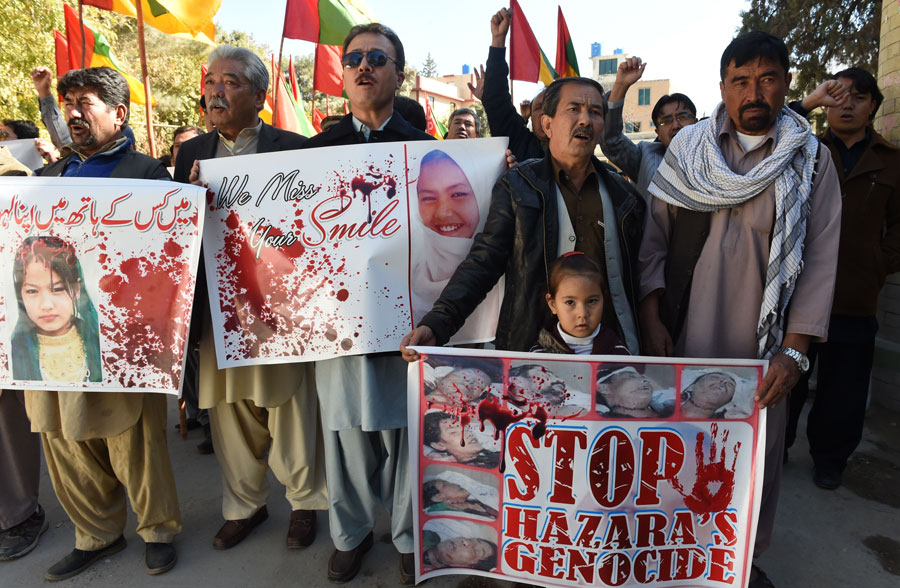
Take the case of the Shiite Muslim Hazaras in Balochistan. They have lost more than 1,900 members of their community in terrorist violence, mainly in Quetta, since 1999, while as many as 2700 have been injured, according to Dawood Agha, president, Balochistan Shia Conference.
From hit-and-run gun attacks to massive suicide bombings, Hazaras have suffered it all. But organised attacks and violence against Shias per se has also intensified since 2003, when Pakistan became embroiled in the war on terrorism.
Dawood Agha says that the targeting and persecution of Hazaras was not state policy, but the acts of non-state actors, who also are locked in a bloody conflict with state institutions. “Pakistan is the victim of a proxy war between Shia Iran and the Wahabis, backed by Saudi Arabia and other Middle Eastern countries…The Iranian revolution of 1979 and the Afghan revolution of 1978 introduced the trend of organised violence in Pakistan by non-state actors.”
Violence in Quetta is not directed against the Hazaras because of their ethnicity, but because of their sect. There are more than 800 houses of Sunni Hazaras in Satellite Town, Quetta – a predominantly Sunni neighbourhood – but none of them have been targeted, Agha said.
“The state is supportive… a number of our youngsters serve in the armed forces and the police. There is no discrimination on this count.”
After hitting a peak between 2003-15, the violence against Hazaras is witnessing a downward trend as the security forces launched a string of operations against militants belonging to the violent Sunni Muslim sectarian groups, killing a number of their top operatives. Yet, the challenge of countering the extremist mindset remains, as there is little check on hate-speech and hate-literature across the country, and both, the mosques’ pulpits and seminaries continue to spew propaganda against this or that Muslim sect or religious minority.
Dr. Jaipal Chhabria, president of the Pakistan Hindu Forum and a local leader of the ruling PTI in Karachi, says that the media, curriculum, certain laws and politics of expediency – all contribute to creating an environment which remains discriminatory and biased against religious minorities.
Take the law-making first.
Earlier, the constitution only barred a non-Muslim from becoming president of Pakistan. “But after the passage of the 18th Amendment, a non-Muslim cannot now become either prime minister or even the chief of the Election Commission,” says Chhabria.
And who were the main movers of the 18th Amendment? he asks rhetorically, responding that supposedly progressive politicians, including Raza Rabbani of the Pakistan Peoples’ Party, Hasil Bizenjo of the National Party and even the self-avowed secular Awami National Party agreed to it. “There was not even one dissenting note from among them.”
For the nearly eight million-strong Hindu population of Pakistan, most of them living in Sindh, the biggest issue is the abduction and forced marriages of their girls – many below 18-years-old. “Hindu girls are abducted and presented in the court several days after the incident, during which they are forcibly converted to Islam. We say child marriages should not be allowed as per law and abductees presented in the court within 24 hours; not after days and weeks,” says Chhabria.
But the bigger problem for Pakistani Hindus is their general negative portrayal in the media, textbooks and the overall national discourse.
“When the media here criticises Narendra Modi,” says Chhabria, “it criticises him as a Hindu, not as the Indian Prime Minister. In the textbooks, we are dubbed ‘kafirs,’ while in movies and dramas, Hindus are always portrayed as villains – ‘Hindu baniyas.’ No Hindu has ever been portrayed as patriotic.” He continues, “Similarly, there is discrimination in jobs… Hindus are never considered fit for civil awards though we have many poets, writers, doctors, teachers and sportspeople in our ranks.Muslims living in non-Muslim countries get equal rights. They vote and run in elections like any other citizen, but in Pakistan, the religious minorities only get reserved seats. How can a Hindu or Christian elected on a reserved seat speak candidly if he stands indebted to the party leader for getting him into the house?”
Zohra Yusuf of the HRCP says that the state cannot officially pursue a policy of discrimination and persecution because of the growing awareness about such issues as well as international compulsions. “There is a lot of improvement, but at the same time a lot needs to be done to implement or improve laws as well as to change the mindset of the people,” she maintains.
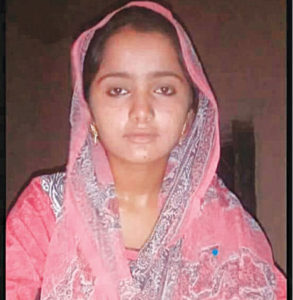
Abducted, forcibly converted and married to Muslim men: Ravita Meghwar, 16.
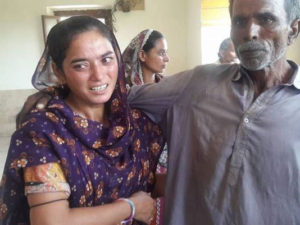
Anila Dhawan
Professor Anjum James Paul, chairman of the Pakistan Minorities’ Teachers Association, however, says that Pakistan’s Constitution is full of contradictions regarding the rights of religious minorities. “The Constitution grants citizens’ equal rights in one article, but then there are several others which stand in negation of basic rights… this is the world’s only constitution which protects just one religion and denies the same right to others.
“If we have to fight extremism and intolerance, then the work starts with the Constitution, which needs amendments ensuring equal rights to all citizens irrespective of faith or religion,” he contends.
Paul, who teaches at a college in the town of Samandri in Punjab, said that the syllabi taught at the schools and colleges also need to be reviewed because of the negative portrayal of other faiths in textbooks. Then there are deep-rooted social taboos, which make the life of the religious minorities, including Christians, miserable, he maintains.
“For instance,” he says “a Muslim can sell ‘pakoras, but a Christian can’t… many Muslims won’t buy edibles cooked by him. There are scores of other basic professions which a Christian cannot go for… a Christian can’t be a butcher or a cook.”
He added that attacks on churches and other places of worship of non-Muslims also occur off and on, and often, the culprits walk out of prison within a couple of years – or less – even if convicted, and then are welcomed as heroes in society.
Centuries-old biases and prejudices clearly exist in 21st century Pakistan. They can only be scrapped through cautious and sustained efforts, primarily in the field of education and through advocacy campaigns geared towards building a national narrative for an all-inclusive Pakistan.
But the task of changing the national mindset is easier said than done as extremist ideas find a perfect breeding and dissemination ground here. This, thanks to successive governments, who paid a lot of lip-service to the cause of reforming madrassas, but backed out each time due to the stiff resistance put up by clerics.
Similarly, changing and improving the curriculum has up to now not been seriously put on the agenda. All the half-hearted attempts in this regard have witnessed a reversal almost from their outset, because of the opposition by the orthodox forces.
Despite the fact that Pakistan has for several years remained locked in the war against terrorism and lost thousands of civilians and security personnel in the process, past governments failed to curb hate speech and literature, which constitutes the extremist mindset and is considered the first step leading to terrorism. The broader fight against terrorism cannot be won without defeating the extremist mindset.
A case in point remains the 20-point National Action Plan (NAP) formulated after the barbaric attack on the Army Public School, Peshawar on December 16, 2014 in which more than 150 people, mostly children, were killed.
While the security forces took care of the operational side of the NAP, cracking down on terrorist groups, the then civilian government did not take ownership of any kind and failed to implement any of the reforms suggested in it, including those for madrassas, education, police and judicial reforms, which were vital for the success in the war against terrorism in the mid to long run.
Will the PTI government – committed to making a ‘naya’ (new) Pakistan – succeed in granting and protecting the rights of the religious minorities and subgroups within Muslims? So far the opening days of the government don’t inspire much confidence, or engender any hope on this score. So far the issue is not even part of the national discourse. The swift ouster of Atif Mian from the Economic Advisory Council indicates only too graphically how the old ways are still the only ways being followed in the ‘new’ Pakistan.
Amir Zia is a senior Pakistani journalist, currently working as the Chief Editor of HUM News. He has worked for leading media organisations, including Reuters, AP, Gulf News, The News, Samaa TV and Newsline.
No more posts to load


